Like any other heating, ventilation, and cooling (HVAC) appliances, heat pumps are prone to various problems you should be aware of for easy diagnosis, troubleshooting, unit maintenance, repairs, or whole-unit replacements.
The unique characteristic of heat pumps – the ability to cool and heat spaces from the same device, sets them up for frequent problems. As much as you enjoy heating, cooling, and dehumidification, be ready to address the occasional heat pump problem whenever necessary.
This article will give you a detailed overview of common heat pump problems along with their causes, troubleshooting, diagnoses, and the solutions to get your heat pump running efficiently again.
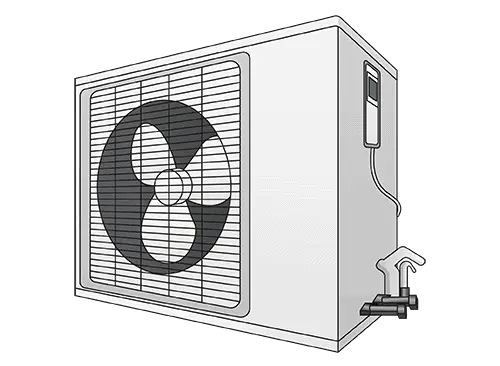
Common Heat Pump Problems
Heat pumps usually develop complications with repeated use. Fortunately, some of these are easy to troubleshoot and correct on your own. Some require the intervention of a qualified HVAC technician, which pushes maintenance and repair costs up further.
Here are eight common heat pump problems you should be on the lookout for to ensure you use and maintain your unit accordingly for longevity even with regular use.
| Issue | Likely Means |
| Heat Pump Not Turning On | Pump may have power issues due to power outage, accidental switch-off, or tripped breakers. |
| Heat Pump Not Heating | Pump may be stuck in cooling mode, low on refrigerant, or has a broken reversing valve. |
| Heat Pump Won’t Cool | Pump may be stuck in heating mode, low on refrigerant, or has a broken reversing valve. |
| Heat Pump Constantly Runs | Pump may be low on refrigerant or too is mismatched for space to heat or cool. |
| Heat Pump Making Strange Noises | Pump may have loose components, clogged air passages, bearing problems, high refrigerant pressure, or a faulty starting capacitor. |
| Heat Pump Is Short Cycling | Pump may have clogged air filter, low on refrigerant, damaged compressor, or mismatched for the space. |
| Heat Pump Smelling Odd | Pump may have mildew or mold on evaporator coils or inside the air passages. |
| Outdoor Unit is Frozen | Pump may be unable to defrost properly, low on refrigerant, or has excess ice on the outdoor unit. |
1. Heat Pump Not Turning On
Sometimes a heat pump may fail to turn on at all when you need it for heating or cooling.
It might seem like a small thing to happen, but it could simply mean that your unit has a small issue. Perhaps a bigger one. Like a total breakdown that necessitates whole system replacement.
Possible Causes of Heat Pump Not Turning On
Power Loss: The very first thing to check if your heat pump won’t start is whether or not it might be a power outage causing the problem.
You can easily tell this by looking around the home for other everyday electrical appliances. If they are off, too, then it’s probably a power loss issue.
Broken Power Supply: If you note that your home is still connected to power, the heat pump may be failing to start because of disconnection in its power supply line. Someone may have accidentally flipped off the mains socket switch.
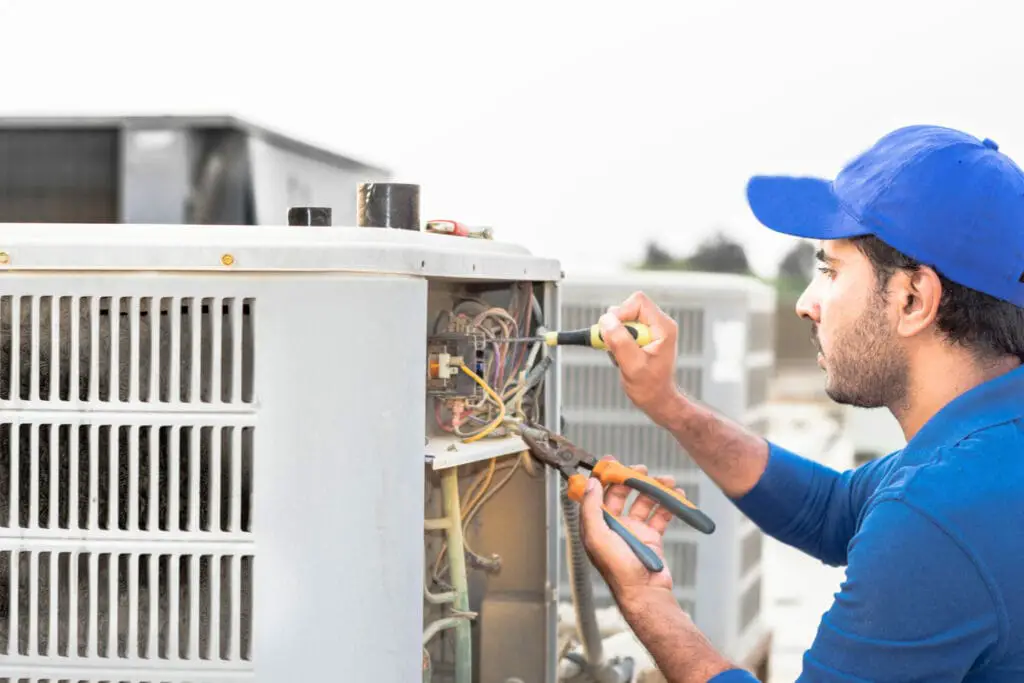
You should also check the heat pump’s two breakers to ensure that they are not tripped. If they are, flip them back on. The system should be on now. Another trip would mean an electrical fault, which an HVAC technician should repair.
Thermostat Problem: The thermostat should always be set to the correct mode based on what you want the heat pump to do. You need to select the right temperature as well.
There could also be miscommunication between the heat pump and the thermostat due to an electrical fault.
Broken Starting Capacitor: If the capacitor that starts the motors is broken, the heat pump won’t power on. You’ll know if that’s the case if you hear a low-volume clicking sound as the pump tries to start.
How To Fix a Heat Pump That Won’t Turn On
Depending on what is causing the issue, the troubleshooting solution may be a simple DIY process or one requiring a professional HVAC contractor to help.
Checking the home’s power supply, reset the thermostat, and flipping switches and breakers back on can all be done easily. However, you should call in a technician for a deeper thermostat or broken capacitor issues.
2. Heat Pump Not Heating
You may notice that your heat pump fails to heat your space when you want it to. It could be stuck in cooling mode even if the display indicates otherwise. Other times the system may be in the heating mode but still fail to heat as needed.
Possible Causes of Heat Pump Not Heating
Incorrect Thermostat Settings: A heat pump whose thermostat is stuck in the cooling mode won’t be helpful when required for heating.
The temperature settings may be the culprit too, and you should ensure you set your pump to operate at about 3°F higher than the room temperature if heating is to occur.- Broken Reversing Valve: When the reversing valve is broken, the heat pump sticks to the cooling mode.
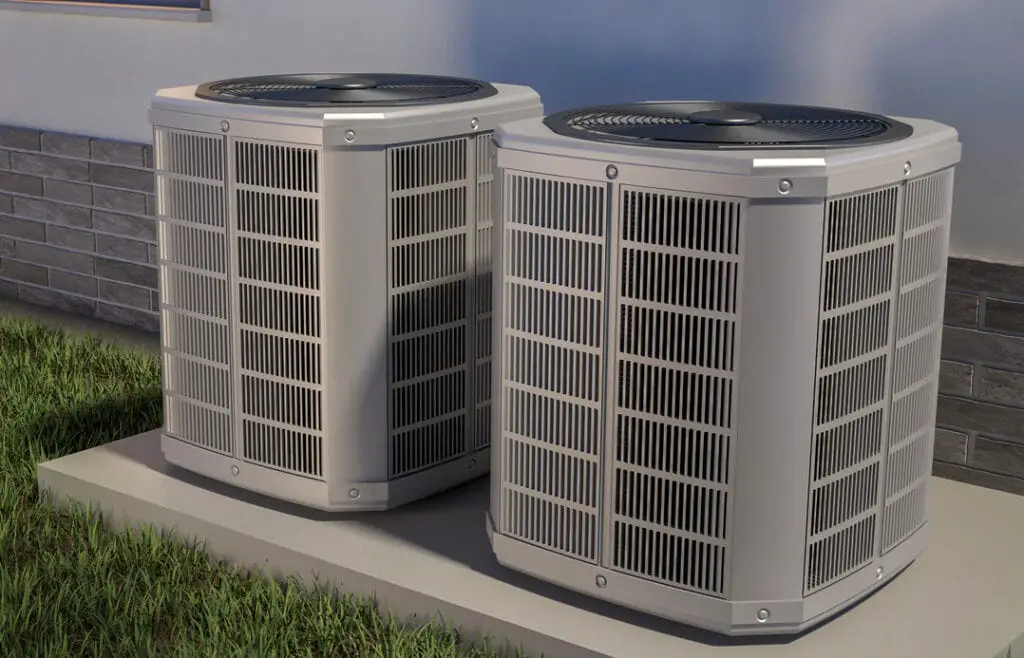
- Low Refrigerant Charge: Leaks may cause the refrigerant level to go so low that the heat pump fails to heat because there is very little of it for transferring the heat to the indoor space.
Poor Airflow: Blocked filters cause poor airflow, which reduces the heating capability of a heat pump.
How To Fix a Heat Pump Not Heating
Ensure the filter is clean and debris-free to improve airflow
Check the system for possible refrigerant leakages and call a technician when you spot them
Check the thermostat settings to confirm the pump is in the heating mode and is set to a temperature at least 3 degrees above the prevailing room temperature.
3. Heat Pump Won’t Cool
A heat pump might fail to cool your indoor space when you want it to. When this happens, the indoor temperature remains high even if the pump is still operating.
During the cooling failure period, the heat pump cannot take the heat from the indoor air in your home, business, or office to channel it outdoors.
Possible Causes of Heat Pump Not Cooling
Broken Reverse Valve: The pump remains in the heating mode when the reverse valve breaks since it fails to reverse the refrigerant’s direction.
Thermostat Issues: It could be bad temperature settings where you set it to operate at a temperature equivalent to or higher than that of the room. Other times there might be miscommunication between the pump and the thermostat.
Low Refrigerant Charge: If your pump is low on the refrigerant, no cooling will occur. Or it could happen, but very little.
Poor Airflow: The air circulation in the system may be faulty if components like air passages and the filter are dirty or clogged.
How To Fix a Heat Pump That Won’t Cool
Check the filter and clean it if it’s dirty.
Reset the thermostat to cooling mode and set the temperature to about 3°F below the current room temperature
Check for refrigerant leaks and call a contractor to recharge.
4. Heat Pump Constantly Runs
Sometimes a heat pump runs all the time and doesn’t shut down. The phenomenon is quite common and could occur any time in winter or summer. Unless you force stop the pump or there is a power loss, the unit will remain running for a long time.
Possible Causes of Heat Pump Running Constantly
A mismatch between pump heating capacity and the volume of the space in your home: If the pump’s capacity does not match the amount of space in your home, the unit will have to stay on all the time to reach its goals.
- Heat Loss Due to Poor Insulation: Loopholes in the home’s insulation system might lead to massive heat loss, making the pump run all the time to compensate for the lost heat.
- Other Causes: A heat pump might constantly run because of other issues such as dirty components, compressor problems, low refrigerant levels, or a frozen outdoor unit.
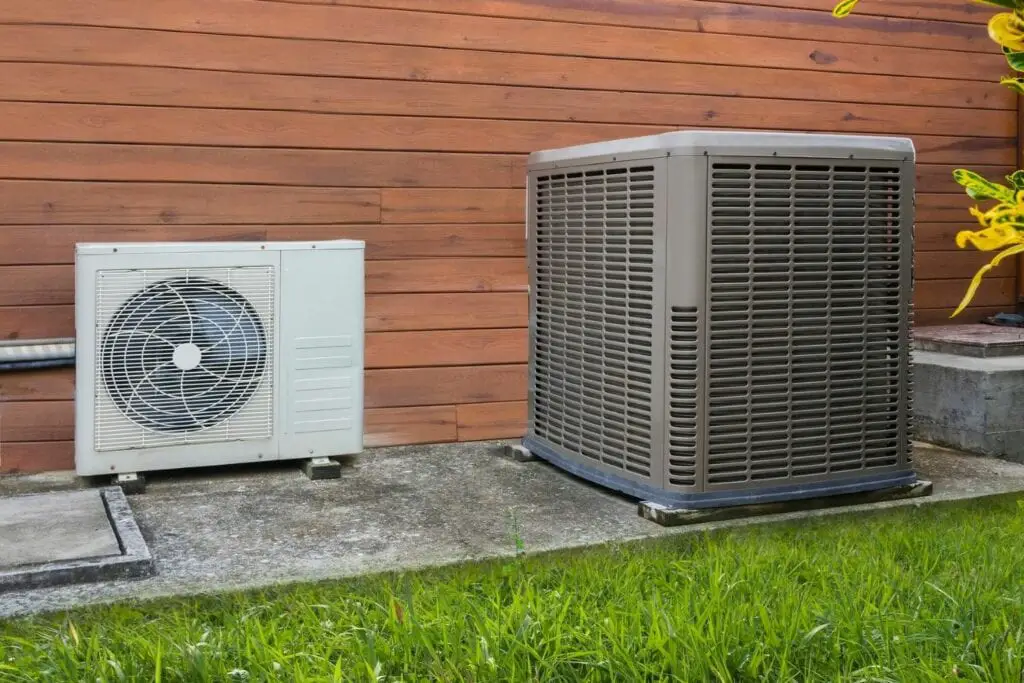
How To Fix a Heat Pump That Runs Constantly
Clear ice and debris on the outdoor unit
Check components like air filters for cleanliness or the need for replacements.
Check your home for insulation loopholes like open windows and fix them
Replace the heat pump if the one you have doesn’t match the heating capacity with the amount of space you want to heat or cool.
5. Heat Pump Making Strange Noises
Typically, a heat pump will only produce a subtle humming sound when powering on or during operation. However, you may hear some strange noises like clanking, buzzing, whistling, squealing, or high-pitched screaming.
Possible Causes of Strange Noises in a Heat Pump
Loose Internal Components: Any loose parts within the system will keep moving about and producing peculiar sounds when the heat pump is working.
Clogged Air Routes: When too much dirt accumulates on the air passages and the filter, whistling sounds are produced as the air tries to flow through the narrow passages.
Condenser Fan Bearing Problem: Squealing noises will be many in the outdoor unit when there is a bearing problem in the condenser fan.

Troublesome Starting Capacitor: If the starting capacitor is faulty, the heat pump keeps buzzing even after the start.
High Refrigerant Pressure: Does your heat pump produce a high-pitched screaming sound? Its refrigerant might be under extremely high pressure, which could cause a total unit breakdown.
Blower Motor Bearing Problem: You’ll hear a squealing sound indoors if the blower motor has bearing issues.
Compressor Failure: Both clunking and squealing can be heard at once if there is a compressor failure. It may be caused by a loose or worn-out pulley in a belt-driven unit.
How To Fix a Heat Pump Producing Strange Noises
Check and replace or tighten loose and worn out components
Lubricate the moving parts
Call in an HVAC expert to check and lower the pressure of the refrigerant
Ask a qualified technician to check the system and handle the issue of a broken capacitor
Clean air passages
6. Heat Pump is Short Cycling
Short cycling refers to a situation where an electrical appliance goes into a series of on-and-off sessions due to some malfunctioning. When a heat pump is short cycling, it has trouble heating or cooling and cannot maintain the temperature you set for it.
The on-and-off habit can be a ‘survival mechanism’ the heat pump uses to avoid overworking or a looming total crush.
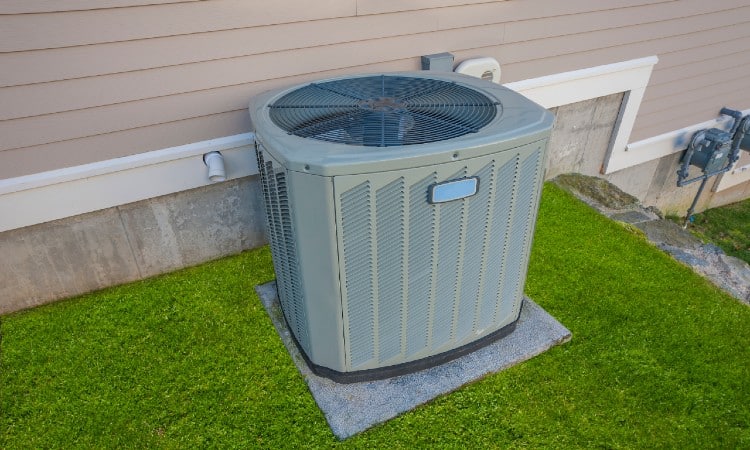
Possible Causes of Heat Pump Short Cycling
Clogged Air Filter: When the air filter has debris or dirt caked into it, the heat pump will struggle with proper or sufficient airflow, making it force itself into repeat on and off sessions as it tries to avoid overworking.
Low Refrigerant Levels: Many heat pump problems arise from a system low on refrigerant.
When the coolant level is too low, the system can’t run sustainably and efficiently. The unit has to keep going on and off as it attempts to reach a healthy equilibrium.
Bad Thermostat Settings: Setting the wrong temperatures for the heat pump means that it will keep going off and restarting as it tries not to overwork itself. You might have set a temperature that is too high for heating to be achieved.
A faulty thermostat may also be the problem if the pump fails to reset to either heating or cooling after meeting its objective.
For example, if the pump heats the space to the set temperature and doesn’t readjust to cooling, miscommunication between it and the thermostat will cause it to keep shutting off to avoid overworking.
Overheating Due to Airflow Issues: Electrical appliances that depend on airflow within them and have fans and coils are usually prone to overheating.
As the device tries to protect itself or some crucial components from self-destruction, it tends to shut off completely or go into repeat on-and-off cycles.
When off, the heat pump cools down and can thereafter work again for some time until it overheats once again and has to force-stop itself for another round of internal cooling.
Heat Pump Size and Space Mismatch: Installing a small heat pump for a large space makes it overwork as it struggles to heat or cool effectively. The unit then has to keep shutting off and restarting in an attempt to protect itself from destruction.
Icing on Coils: The coils will stop working as expected when there is too much ice. The shutting and restarting will also be an attempt at self-preservation.
Damaged Compressor: The compressor pressurizes the coolant and moves it within the system.
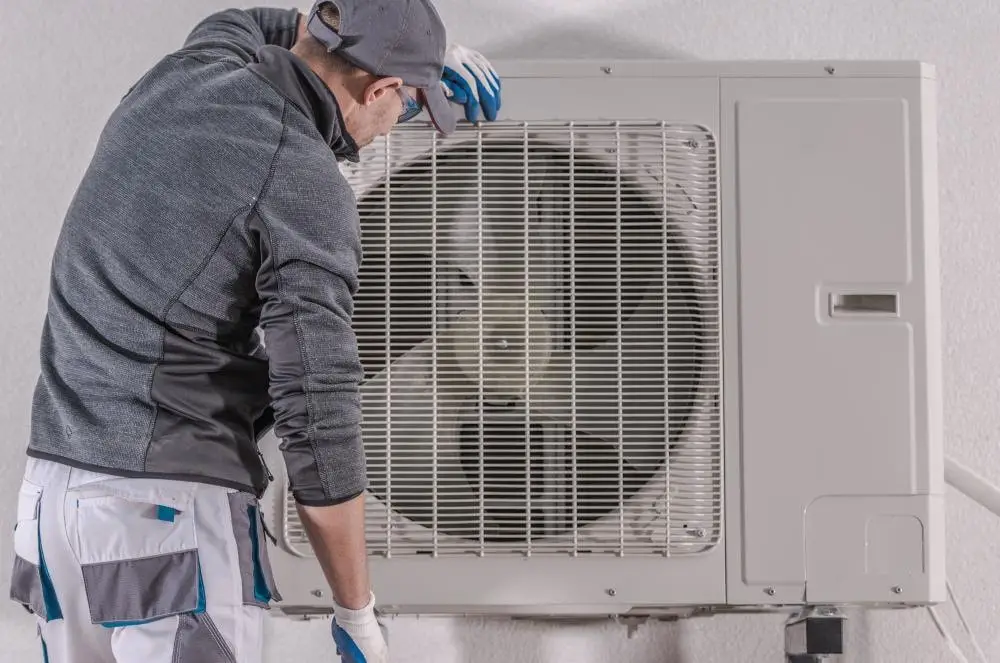
When it is broken, the refrigerant circulation will be affected, and the heat pump will keep shutting off and restarting as it struggles to heat or cool.
How To Fix a Short Cycling Heat Pump
Check the air passages and the filter for dirt and debris like hair, lint, or mold. Clean the affected parts to improve the airflow.
Checking the thermostat to ensure it has the correct settings and is communicating fully with the heat pump. An HVAC expert can help you with checking for and correcting communication issues between the two.
Ensure a technician checks your heat pump’s refrigerant levels and recharges it if it is low.
Remove the icing on the coils gently with gloved hands. Do not use force or sharp objects since the coils are delicate heat pump components.
Re-evaluate the suitability of the heat pump about the size of the space you want it to heat or cool. Consider replacing it with a bigger one.
Call in an HVAC contractor if you suspect the compressor is faulty.
7. Heat Pump Smelling Odd
Although it is rare, sometimes heat pumps produce a bad odor and fill the home with an odd smell you can’t withstand, especially if it is persistent.
It could be the smell of rotten eggs. But most smelling heat pumps exhibit the “dirty sock syndrome” since they produce the odor of damp socks. Sometimes it could be a burning odor – the kind that happens when an electrical device overheats or burns.
Possible Causes of Odd Smells in a Heat Pump
- Refrigerant Leaks: If your heat pump is leaking, the air it blows into the living space will have traces of freon odor.
- Mildew or Mold in Evaporator Coils or Inside Ducts: Moisture build-up in the system causes the growth of mold or mildew in the air passages and evaporator coils. It is this mildew or mold that brings a damp bad odor when air passes over it.
- Overheated Heaters: Clogged air filters cause the system to overwork to bypass the airflow problem. When this happens, the heart pump usually overheats, producing a burning odor.
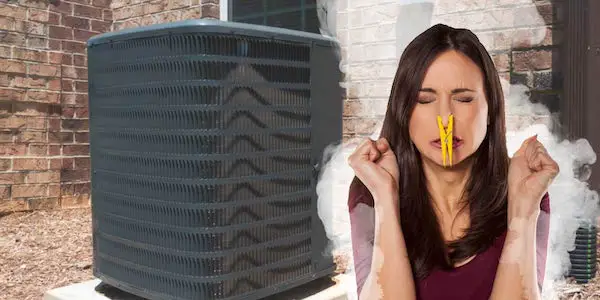
How To Fix a Heat Pump That Smells Bad
Check the air passages and filter for dirt and clean them.
Clean the moldy air filter and passages with a mold-killing solution for HVAC systems.
8. Outdoor Unit is Frozen
A frozen outdoor unit is another common heat pump problem. It occurs any season but is more common in the winter when there is plenty of snow or ice, which causes the unit to cool down excessively and freeze.
Possible Causes of Freezing in Outdoor Unit of A Heat Pump
Excess Snow on the Unit: If too much snow collects on or around the unit, chances are high that it will cause the outdoor unit to freeze.
Improper Defrosting: Heat pumps can defrost themselves. If this functionality is impaired, the system fails to clear all the icing, and the outdoor unit freezes.
Impaired defrosting might be caused by a broken reversing valve or faulty controllers and sensors.
Low RefrigerantRecharge: When the heat pump is low on refrigerant, the defrosting process and the pump’s natural means of warming itself up fails, causing the outdoor unit prolonged exposure to cold and eventual freezing.
Broken Outdoor Fan: The fan in the outdoor unit facilitates airflow over the coils to maintain a friendly working temperature within the unit.
How To Fix a Freezing Outdoor Unit of a Heat Pump
Check if the pump completes the defrosting cycle. If this doesn’t happen, call in an HVAC professional to check and repair the system.
Check the outdoor fan and replace it if it is broken.
Call an HVAC expert to check the reversing valve, controllers, and sensors for impaired functionality.
Use some water to melt the ice on the coils. Again, avoid removing it with pointed, hard, or sharp objects as the coils are fragile and prone to damage.
Clear the snow around the outdoor unit during winter.
Ensure no water leaks onto the unit from leaky gutters or unattended garden hoses.
Troubleshoot or Replace?
As noted earlier, you can either do troubleshooting or replacements of some parts or the entire heat pump.
When Troubleshooting a Heat Pump is Better
You might want to do basic troubleshooting and diagnosis in any (or a combination) of the situations highlighted below:
When the unit is relatively new
If there haven’t been any demanding repairs before
If you have the proper basic understanding of HVAC systems and how a heat pump works
If you still have the heat pump’s manuals and can easily follow them to diagnose the unit
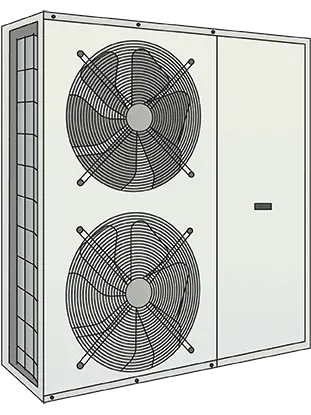
When It’s Better to Replace a Heat Pump
Be sure to replace your heat pump when you are in any (or a combination) of the situations below.
When the heat pump is too old or well past the average age of 10-15 years
When the cost of maintenance and repairs exceeds the price of a similar new system
When you want to upgrade from an inferior model to a finer one
When the pump’s problems are many and occur frequently
If there are too many components that require frequent repair or replacement
When you discover a mismatch between the pump’s capacity and the size of your home, office, or other space where you use the unit.
Conclusion
Despite their unique functionality for cooling, heating, and dehumidification using the same device, heat pumps are vulnerable to different problems that reduce their efficiency and necessitate regular repairs and part replacements or even changing the entire system.
The good news is that you can easily diagnose and solve most heat pump problems with the help of the user’s manual or information from the Internet. However, some issues are complex to handle and always require the intervention of an expert HVAC contractor.
People Also Ask
Heat pumps are highly intriguing HVAC appliances because of their versatility. But as we noted earlier, it’s this same versatility that sets them on the path of developing different problems. Here are some frequently asked questions to help you understand heat pumps better.
If you notice any or most of the problems we have discussed here, you most likely have a bad heat pump. It could be a failure to cool, heat, or turn on. In other cases, the system may run constantly, produce strange noises, or keep going on and off frequently.
The inefficient performance also indicates that you may be using a bad heat pump that requires routine maintenance, repair, or replacement.
Not all heat pumps have a reset button. Some old models have a manual reset switch for ‘rebooting’ the system when required. Most modern heat pumps have a reset button for the same purpose, and its color or location may differ from model to model.
The many issues that result from a low refrigerant charge level in a heat pump should be good signs towards this end. There’s no shortage of indicators from short cycling to bad odor to running without ceasing to freezing to not cooling and not heating.
You may also note some leaks or freon odor. If you suspect that the heat pump is leaking or low on refrigerant, it’s crucial to call in an HVAC professional to check the unit for leaks and do repairs or a refrigerant recharge accordingly.
The average heat pump lasts 10-15 years of regular use. However, the duration could go as high as over 20 years if you maintain your unit well and allow it to go lazy at times you don’t need its service.
Troubleshooting Guides
Here are some related guides we have that you may be interested in:
